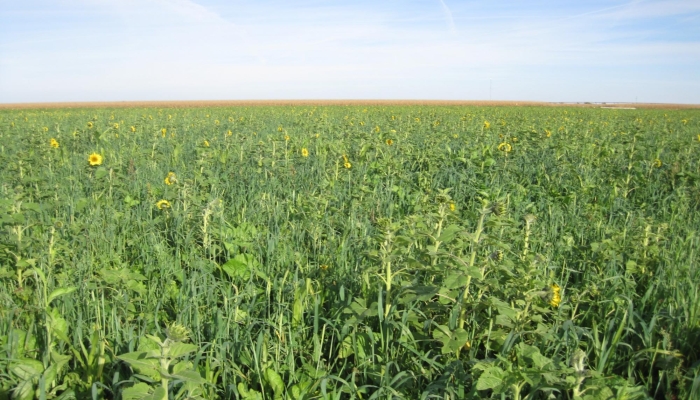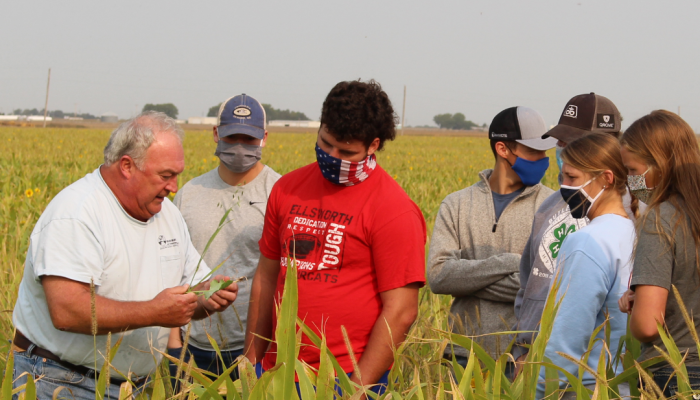Better Soil, Better Health—For Plants and People
3rd Annual Project GROW Winter Workshop Held
Soil health is in the hands of farmers. This was the key take away from the 2020 Project GROW Winter Workshop, hosted by the Upper Big Blue Natural Resources District on December 3. Most of the speakers were virtual, but the information on how to improve soil health and profitability were real and applicable for the nearly 100 people gathered in-person and online.
The keynote speaker was Dr. Jill Clapperton, international soil health expert. Due to the pandemic, Clapperton joined the Project GROW event from her farm in Washington. Clapperton is the principal scientist and owner of Rhizoterra Inc, a science-based organization dedicated to increasing soil health around the world through research and education. Clapperton explored a variety of topics pertaining to soil health and its links to human health during her sessions. Recordings of Dr. Clapperton’s presentations, as well as the other Project GROW speakers’ sessions, are now available online.
Clapperton presented on the complex web of organisms at work in the soil, from mites to mycorrhizal fungi, and the predator-prey relationships that govern a healthy soil system. Clapperton advocates for practices including reduced tillage, reduced chemical inputs, diverse crop rotations, incorporating livestock grazing, and cover crops as ways to increase the biological activity in the soil. Improving the soil has many benefits, from increasing its water and nutrient holding capacity, to reducing erosion, to improving water quality. Clapperton made the case that producers can focus on soil health and be profitable—it doesn’t have to be an either/or scenario.
This message was echoed later in the day when Dan Leininger, a water conservationist with the NRD, and local producer Scott Gonnerman presented on the progress made at the Project GROW (Growing Rotational crops on Wellfield) demonstration fields in York. In the most recent growing season, the fields were profitable as Leininger and Gonnerman implemented soil health practices on the city’s wellfield, such as planting soybeans into a standing cover crop of rye on one of the fields. “I like planting green,” Gonnerman said, showing a photo of the minimal disturbance method he used when planting the soybeans. After emergence of the beans, he used a roller/crimper to flatten the rye. Gonnerman, who was named a master conservationist by the Omaha World-Herald in 2018 for his farm practices, talked about how he has increased the water infiltration rate of his own fields dramatically in the span of ten years through investments in soil health. In a recent test, his soil infiltrated two inches of water in less than two minutes. While the Project GROW demonstration fields are only in year three of a five-year project to restore the soil structure, Gonnerman and Leininger noted that the infiltration rate is increasing there as well, which means less erosion, flooding, and nutrient loss.
Tatiana Davila, a groundwater geologist with the Nebraska Department of Environment and Energy, spoke to event attendees on the topic of water quality in Nebraska. Davila manages the Wellhead Protection Program and Source Water Protection Program for the state, helping communities guard their groundwater against contamination by working collaboratively with stakeholders from the local, state, and federal levels. “Everyone is a stakeholder when it comes to water,” she explained. Nebraska is a groundwater dependent state, both for drinking water and irrigation. “The majority of samples show that groundwater in Nebraska is of very high quality,” Davila noted. “However, the samples also show a number of contaminants continuously show up in certain areas of the state in high concentration,” such as nitrate-nitrogen, atrazine, and a variety of chemicals linked to agricultural production. Studies have linked these contaminants to a variety of health concerns, including pediatric cancers and birth defects. Nebraska has some of the highest rates of pediatric cancers in the U.S. explained Davila. Continuing to improve agricultural practices and remediate for legacy nutrients in the groundwater system is vital to the health and wellbeing of Nebraskans.
The final speaker of the day was state climatologist Al Dutcher. Dutcher recapped the weather patterns in Nebraska in 2020 and predicted some possible weather outcomes to look for in 2021. He also looked at weather patterns that will affect other grain and soybean producing nations including Brazil, Australia, and South Africa to predict how global markets might respond to future events. The fall 2020 period in Nebraska has been warmer and dryer than normal and Dutcher predicts drought conditions will continue through the winter and possibly into the spring.
That forecast makes the Winter Workshop emphasis on soil health all the more important, says Leininger. "Good soil health is really a buffer against weather extremes," he said. "We're having more frequent big rain events and then long periods without much moisture. When the soil is healthy and has a good infiltration rate, it will lock in all the moisture from a heavy rain instead of having it run off. Having the soil covered means that it will hold onto moisture longer, even in times of drought."
The Winter Workshop also included programing for area high school students, who met with Clapperton via Zoom on December 3. FFA and ag students from York, Milford, and McCool Junction learned about the elements of soil health and why it's worth investing in it, as well as careers in soil science.
Missed the Winter Workshop or just hungry for more? Learning opportunities will continue in the next few months, as the NRD offers a diverse set of speakers and topics at upcoming nitrogen management training events. On December 16, an event will be held at the Leadership Center in Aurora featuring Dean Krull (UNL Extension), who will present the latest research on interseeding cover crops into standing corn. The event will also include a speaker from the Aurora Coop presenting on nitrogen use efficiency. For a full list of upcoming training dates, topics, and speakers, please visit www.upperbigblue.org/events.


